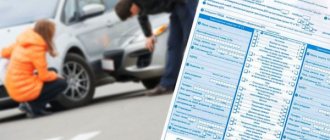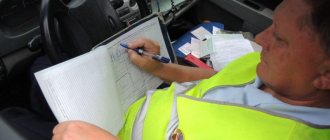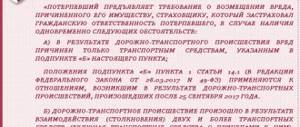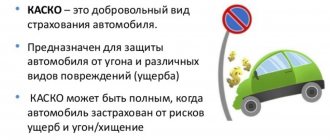Every driver knows that his car must be insured. After all, the law obliges every motorist to take out an MTPL policy, which protects not only the car and the driver himself, but also his civil liability. But not everyone is satisfied with the conditions prescribed in OSAGO, the not very diverse list of insured events and relatively small payments. And that is why the contract of additional car insurance against various troubles called CASCO is so popular.
In this article, we will briefly describe the features of CASCO as insurance, and also analyze in detail all the necessary actions that the policyholder must take in the event that an insured event occurs with his vehicle.
Features of CASCO insurance
Unlike MTPL, the CASCO insurance policy is voluntary and can be taken out by the driver at will. The main distinction between the forms of insurance under consideration is possible liability. OSAGO covers damage caused by the culprit of the accident to other road users, while your own car will have to be restored at your own expense. CASCO has a different purpose - it protects only the owner’s car from almost any harm, even if it did not arise as a result of an accident. At the same time, CASCO does not insure liability in any way, and in the absence of compulsory motor liability insurance, other participants will have to compensate for the damage themselves.
The cost of issuing CASCO insurance is much higher, but the policy covers almost all possible damage. For both policies, the basis for providing compensation is the occurrence of an insured event. In compulsory motor liability insurance, an insured event is considered solely the fact of registration of an accident, while the driver himself should not be the culprit of the accident. In any other situations, the insurance company has the right to refuse to provide payment.
IMPORTANT !!! CASCO covers almost all situations resulting in damage to the car. In this case, it does not matter the circumstances of what happened (as part of an accident or not), as well as the fault of the driver himself.
Despite this, there are some rules, the violation of which will be the reason for refusal by the insurance company.
Types of insurance risks under CASCO
Different companies, based on the CASCO rules in force in them, include various insurance risks in their contracts. And if we summarize all the information received, we can distinguish the following types of insurance risks :
- Damage, including complete destruction.
- Theft.
- Protection of additionally installed equipment.
- Civil responsibility.
- Accident.
- Loss of commodity value.
- GAP
- The occurrence of unforeseen expenses.
the cost of the policy itself will depend on how many and what CASCO insurance risks Each item on this list includes insurance events of a certain nature, upon the occurrence of which the owner of the vehicle can count on compensation for damage. And in order to decide which risks to include in the CASCO agreement , let's look at them separately and in more detail.
Damage
The “Damage” risk involves paying compensation if any damage is caused to the car or if it is completely destroyed. The insured event for this risk is the following events:
- Road accident - when leaving a parking lot or parking lot, collision with another vehicle on the roadway, damage to a non-moving vehicle, damage to other mechanical vehicles in the parking lot, collision with various objects, people or animals, overturning or falling of a vehicle, damage to a vehicle due to the fault of road traffic -operational, utility or technical services.
- Fire or explosion as a result of arson, lightning strike, or transfer of fire from a nearby object.
- Natural phenomena - earthquake, landslide, landslide, volcanic eruption.
- Hydrological phenomena - flood, high water, ice drift.
- Meteorological phenomena - whirlwind, hurricane, tornado, lightning strike, hail, tsunami, mudflow.
- Falling foreign objects - snow, ice, aircraft, parts of buildings and structures.
- Breaking glass - windshield, rear and side, glass of lighting fixtures, hatches.
- Actions of animals - external and internal damage.
- Illegal actions of third parties - damage to the vehicle, theft of individual parts, components, and assemblies.
- Accidents of networks - water supply, sewer, heat.
- Vehicle failure is a failure under the ground, failure of roads and bridges, failure under ice.
- Man-made accidents and disasters.
- Damage during transportation - towing, evacuation with full or partial loading.
- Lawful actions of law enforcement officers, emergency or rescue services.
- Terrorism or terrorist act.
Theft
The risk of “Theft” means the complete loss of a vehicle as a result of theft, robbery, robbery or theft. Any of these illegal actions is subject to criminal liability. In some companies, theft is divided into two types - theft of a vehicle with documents and keys inside and vice versa.
Dear OSAGO? Restore KBM now
and stop overpaying insurers!
The service will send an application to RSA. Recovery time for KBM: from 12 hours. Find out more
For vehicle owners, having decided on CASCO insurance, the risks of damage and theft are not only the most pressing, but also the most popular. Insurance cases for them occur much more often than for others. Their presence determines the completeness of insurance coverage.
Optional equipment
Additional equipment is all units and devices that are not included in the standard configuration of the vehicle when it leaves the factory. The client, at his own expense, if desired, installs it on his vehicle. The risk of damage or complete destruction of additional equipment is usually accepted for insurance separately from the CASCO policy. Protection of such units and equipment is carried out under the same conditions as the car itself.
Civil responsibility
The “Civil Liability” risk can be added to the standard set of insurance events included in the CASCO policy. It implies an expansion of MTPL insurance coverage. In other words, DSAGO is insurance of liability of the vehicle owner and drivers included in the policy to third parties regarding damage to property, life and health. This insurance is voluntary and is included in the CASCO policy only at the request of the Client.
Accident
Such a risk is added to the policy on a voluntary basis strictly at the request of the policyholder. An accident is the insured person receiving injuries of varying severity due to reasons beyond his control. This category includes not only physical injuries, but also serious impairments in the functioning of the human body, permanent loss of ability to work (disability of groups 1, 2 and 3) and death as a result of an accident.
Loss of marketable value
The risk of loss of marketable value is a fairly popular addition to the CASCO policy, since as a result of an accident and subsequent repairs, the vehicle may lose its original appearance. Because of this, its cost will significantly decrease, which will directly affect the amount of insurance compensation in the event of a loss. CASCO risks associated with loss of market value are quite relevant today. The demand for them among buyers of CASCO policies has recently increased.
GAP
Over time, any product loses some of its beneficial properties. Cars are no exception. Including a risk such as GAP in your CASCO policy will allow you to compensate for the difference between the actual cost of the vehicle and its original price. This is especially true when paying damages for the complete destruction of a vehicle or theft.
Unexpected expenses
This risk is included in the CASCO policy in case the policyholder incurs unforeseen expenses, for example, if it is necessary to pay for the services of an emergency commissioner or legal assistance. Typically, such expenses are associated with registering or eliminating the consequences of an accident. The insurance company will be able to compensate for the following expenses:
- Technical assistance with travel to the location of the car - damage to tires and wheels, delivery of gasoline, elimination of faults that do not allow you to independently deliver the vehicle to the service, evacuation, replacement of a dead battery, repair of damaged door locks, trunk and hood, alarms.
- Baggage – this includes damage or loss of luggage and valuables that were inside the car at the time of the accident.
- Animals – expenses associated with the treatment or death of a pet in the cabin are compensated.
- Transportation costs are expenses associated with forced use of the services of private carriers and taxis.
- “Replacement driver” - calling a specialist to transport the vehicle and its owner to the place of hospitalization or to the parking lot due to the physical incapacity of the policyholder.
- Replacement car – expenses for forced rental of a vehicle due to the impossibility of using the technically faulty car of the policyholder.
- Seeking advice and assistance from specialized lawyers.
- Calling the emergency commissioner.
- Resolution of disputes in the event that an accident occurred outside the Russian Federation.
By insuring your car under CASCO, the risks of unaccounted expenses will be indifferent to you. Any of these insurance risks can be added to the CASCO policy at your request. But different insurers will have different options. You can obtain information about the presence of a particular risk by reading the individual insurance conditions. And the knowledge gained about existing CASCO insurance risks will help you decide on the choice of CASCO conditions and the set of insurance risks .
Renew OSAGO at the best price!
Reasons for refusal to pay under CASCO
The grounds under which the insurance company has the right to refuse to provide payment are listed in the concluded contract.
There can be quite a few such situations:
- gross violation of traffic rules resulting in harm. Serious violations include: speeding by more than 60 km/h, driving while intoxicated, driving in the oncoming lane. On the same basis, the insurer may refuse if the driver does not pass the technical inspection within the prescribed time. In any case, it is necessary to prove that the accident occurred precisely as a result of the driver performing certain actions, otherwise the insurer is obliged to pay compensation;
- violation of the procedure after an accident. Often the policyholder deprives himself of the opportunity to receive compensation. You cannot write a receipt or a statement stating that there are no claims against the culprit, since in this case the insurer will not be able to make claims against him, and the insured will lose payment;
- violation of the rules for registration of road accidents. In order to avoid problems with the insurance company, it is necessary to call the traffic police immediately after the accident. Only on the basis of a correctly documented accident can you receive payment. It is also important to monitor the information provided, it must correspond to reality;
- self-repair of the vehicle. If work has begun to independently restore the car, the insurance expert will not be able to accurately determine the amount of damage caused, which will result in a refusal.
The above cases are general and apply to any insurance contract.
In addition, each insurer may offer other ambiguous conditions that may cause problems with obtaining compensation:
- Damage to a vehicle as a result of a fire in another nearby vehicle;
- damage to the vehicle due to falling objects or cargo from another vehicle;
- other violations of established rules by the owner.
To know about all the grounds in each specific case, you should study the signed agreement in as much detail as possible.
What to do in case of an accident?
The most common insurance event under comprehensive insurance is a common road accident. And this is not surprising - it makes no sense to buy vehicle insurance without addressing the main threat to it. The algorithm of actions in the event of an accident is identical to receiving compensation using a compulsory motor liability insurance agreement. If you get into an accident you need to:
- Record the incident. To do this, be sure to stop after the accident and do not move the vehicle again, and only then call the traffic police inspector;
- While the traffic police inspector is on the way, take photographs of the scene of the accident, take contacts of witnesses and other participants in the accident;
- Call the insurance organization with which you have a CASCO agreement, contact your specialist. If necessary, call him to the scene of the incident;
- Receive all the necessary documents and reports from the traffic police inspector documenting the circumstances of the accident;
- With the received documents and insurance contract, contact the insurer's office and assess the damage to the vehicle. If the insurance amount established by a specialist does not suit you, then you retain the right to an independent examination at an appraisal bureau;
- Based on the available documents, receive the compensation due to you or draw up an agreement on repairs at the expense of the insurer, if such is provided for in the contract.
As you can see, the only difficulty will be in preparing the papers and the need to record almost every scratch on the car. At the same time, your main risk in this entire operation is to stumble upon an unscrupulous insurance organization. We will talk about how to deal with it below.
The procedure for receiving payment under CASCO
To receive payment in case of car damage, you must comply with the following rules:
- It is important to call the traffic police immediately after the incident. Depending on the nature of the incident, other services may be called: the Ministry of Emergency Situations, the police. This is necessary to record all the circumstances of what happened;
- until the fact of the incident is registered, the vehicle cannot be moved or moved;
- signing any agreements with other participants in an accident should be done with caution, as this may become a reason for refusal to provide compensation;
- When drawing up a protocol, a traffic police officer should indicate all the features of the incident; the protocol should be as detailed and accurate as possible.
If the moment of the incident was recorded on road surveillance cameras, it is necessary to indicate this. It is best to immediately write down the number and name of the camera.
After reporting an accident, it is important:
- contact the insurance company as quickly as possible and report the occurrence of an insured event;
- along with the application, provide all required documents, keeping copies with you;
- The damaged vehicle is sent for examination. It is advisable to immediately find out all the features of its implementation;
- After registering the appeal with the insurer, you should receive its number and constantly monitor the progress of the consideration. It is not recommended to wait until the end of the term; it is better to remind yourself in advance.
After this, the insurance company must give an opinion on the possibility of providing compensation, as well as its amount.
Terms of compensation for damages under CASCO
The period for receiving compensation is counted from the moment the documents for its payment are submitted.
There are no laws or regulations that provide for the terms of compensation for damages under CASCO; they are indicated in the rules of the insurance company or on the policy.
The policyholder is obliged to know the terms of payments under CASCO, which are specified in the insurance contract.
These types of deadlines are established in the contract by agreement of the parties and are dispositive. The average period for compensation for damage can range from 15 to 30 days. This term is necessary for the insurance company to review the submitted documents and make a decision on material compensation or prepare a referral for car repairs.
There are situations when deadlines are delayed. This usually happens if it takes a long time to agree on the cost of the car, as well as if there is a queue for payments.
To speed up the compensation process by agreeing on the cost, you can contact the service station. At the same time, add a cover sheet with a request for compensation for the services of the service center to the general package of documents.
If the delay in compensation is due to a long queue for payment, the insurer is obliged to notify the policyholder about this.
When the compensation is to send the car for repairs, the time it takes to receive the vehicle may depend on the following factors: the availability of necessary spare parts at the service station, the queue at the service station, the complexity of the repair work, coordination of the scope of work with the technical center.
In case of violation of the deadline for payments under CASCO, it is necessary to send a claim for damages to the insurance company within up to seven working days. Only after the expiration of the specified period can you go to court with a statement of claim for the forced collection of insurance compensation and payment of a penalty for violating the terms of the insurance contract.
Insurance company statistics show that the most careful drivers on the roads are people who have a family and children. They are considered calmer and more responsible. Drivers over 35 years of age behave more calmly behind the wheel and get into accidents 10% less often than others.
Terms for providing compensation
Compensation under CASCO can be provided in the form of cash or by car repairs. Another difference between CASCO and OSAGO is the deadlines established for the provision of compensation. The law does not regulate in any way the deadline that the insurer has to make a decision. This issue remains within the framework of local regulation - the company must specify this point in its regulations.
ATTENTION !!! When concluding an agreement, reference is made to the internal rules, therefore, to clarify this point, it is necessary to study the signed agreement.
The period may begin from the moment all necessary documents are provided, or after the completion of the examination and issuance of the conclusion. The average processing time is 2 to 4 weeks and may vary slightly depending on specific circumstances. According to statistics, large insurance companies try to reduce the waiting period as much as possible. Unknown organizations may delay making a decision for several months.
If there is no reference to exact deadlines in the documents, you can write a complaint to the company after 2 weeks have expired and demand compensation for all damage within a week. The company must provide a written response to such a complaint indicating the reasons for the delay. In case of refusal or ignoring the requirement, you can prepare and file a lawsuit in court. In this case, there is a high probability of receiving additional compensation as a penalty.
Poor car restoration
Another important problem has always been poor quality repairs of a car that “comes” to a repair shop due to an insured event. Usually the trick is to simply replace a good but faulty part with a cheaper option.
If you notice such a factor, then you have every right to contact the same workshop with a request to make the repair again - as it should be.
If the relationship with the service station has completely deteriorated, then proceed through the court by filing a claim complaining of poor-quality repairs, supported by technical documentation for your car and photographs of the spare part that the service station installed.
It is also necessary to remember that in order to resolve such disputes through the court, there are statutes of limitations for applications and the time when exactly you discovered the problem after repair:
| parts and work that are still under warranty | the limitation period is calculated by the warranty periods themselves |
| labor and parts without warranty period | the period has long been calculated over 10 years |
You can also file complaints with the society or the consumer protection department, submit a document of an independent examination that could confirm poor-quality repairs from such and such a service station or a specialized auto repair shop.
But it’s best to immediately take a closer look at the insurance company, its reputation and the reputation of its partners providing vehicle repair services.
What to do if you disagree with the insurer’s decision
In practice, insurance companies often try to find reasons to refuse to provide compensation or to significantly reduce its amount. If you disagree with the insurer's decision, you should begin to sort it out as quickly as possible so as not to miss the deadlines.
Most often, disagreements arise on the following points:
- decision of the expert commission. Based on the conclusion received, you can go to court pointing out specific points on which there is disagreement;
- according to payment terms. If the deadlines for providing compensation were violated, you should write the first complaint to the organization itself. In most cases, the problem is resolved at this stage. If you continue to ignore the requirements, you must go to court;
- If you disagree with the amount of compensation assigned, you can conduct your own examination. If the difference in amounts is significant, you should go to court. With minimal differences there is no point in arguing.
It should be remembered that an executed insurance contract does not guarantee full compensation for all damage caused. The insurer's decisions largely depend on the actions of the driver himself.
Procedure in case of an insured event
If an insured event occurs, you must:
- Make sure that it is included in the list of cases described in the insurance contract.
- Record what happened - this is done with the help of the traffic police or the police (depending on the nature of the case). Also, it is better to inform the insurance company immediately or within the period specified in the insurance contract.
- Collect documents and write an application to the Investigative Committee.
- Wait for a technical inspection of the car (submit the car for technical inspection) and a specialist’s opinion on the nature of the damage, its causes and further actions.
- Based on the results of the verification, receive a payment.
What is more profitable: repairs or money?
An insurance contract is convenient because it allows you to choose repairs or insurance payments in monetary terms. If you choose to cover the repair of your damaged car with money from the insurance company, then, of course, you carry out the repair work yourself.
This option is beneficial because the driver himself controls the situation with the presence or absence of parts necessary for repair, monitors the timing of repairs and can discuss all the nuances with the technician.
Remember that whenever you have any problems with the timing of issuing a repair order, the repair itself, failures, poor-quality work of the service station and other problems, you can always rely on an insurance contract, which should spell out the nuances corresponding to the problems and ways to resolve them.
If you have nothing to show to the service station or the insurance company that issued you the CASCO policy, it will be very difficult for you to prove anything in your favor. Always rely on the document or law, have your reasons and know your rights well.
Find out how to purchase CASCO insurance from Alfastrakhovanie in the article: CASCO Alfastrakhovanie. The features of the CASCO policy in the MSC company are discussed here.
This article describes the return of the CASCO franchise.









